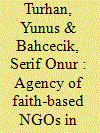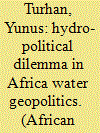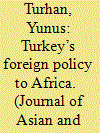|
|
|
Sort Order |
|
|
|
Items / Page
|
|
|
|
|
|
|
| Srl | Item |
| 1 |
ID:
178603


|
|
|
|
|
| Summary/Abstract |
While Turkish faith-based NGOs have been involved in delivering humanitarian aid for two decades, the relations of these organizations with the state have not received adequate scholarly attention. The main purpose of this article is to address this gap by asking what roles NGOs play in Turkey's humanitarian aid policy and practice. Despite the relative isolation of Turkey's administrative structure as a result of a strong state tradition, this paper shows that NGOs attempt to play political roles in Turkish foreign policy. The study relies on an analytical framework derived from constructivism to examine the agenda-setting and information-providing activities of Turkish NGOs between 2004 and 2016. Based on findings from a series of semi-structured interviews with 25 respondents from nine different NGOs and three state institutions, this artilce expands the research agenda on Turkey's foreign aid and shows that NGOs function as knowledge-providers, powerful catalysts for humanitarian aid activities, and influential voices in bringing humanitarian issues to light.
|
|
|
|
|
|
|
|
|
|
|
|
|
|
|
|
| 2 |
ID:
177867


|
|
|
|
|
| Summary/Abstract |
Water-related conflict chronology can be grouped around two broad sets of ideas: On the one hand is material-related conflict such as water stress and under-development; while on the other is management-related conflict including state-failure and lack of governance. In line with the latter form of conflict, this paper gives a specific consideration to the three types of causal factors looming with the potential for conflict over the Nile basin: Political tensions among stakeholders, lack of all-inclusive agreement on management of the Nile water, and states' unilateral actions. By identifying these causal factors, this study limits itself to focus on the initial phase of conflict resolutions, that is diagnosing sources to select some aspects of perceived reality and make them more salient in the methodological context. Based on Johan Galtung's theoretical approaches on conflict dynamics, the paper explores two areas that are lacking in current literature. It accounts for the sources of conflict over the Nile basin hinging on three variables, while mapping the nature of the on-going negotiation process around Ethiopia's “Grand Ethiopian Renaissance Dam” construction. This process is distributive in form and offers a collaborative (win-win) form of negotiations to cement the latter and to redress current predicaments.
|
|
|
|
|
|
|
|
|
|
|
|
|
|
|
|
| 3 |
ID:
180693


|
|
|
|
|
| Summary/Abstract |
The shift in bearing on the traditional status quo Turkish foreign policy orientation has recently been studied through various approaches commonly associated with changing trends, to seek the theoretical and methodological pillars that underpin the state’s policy behaviours towards new regions, including Africa. Accordingly, over the last two decades, ideas, linguistic constructs, identity, and religious and cultural factors have been added to an overarching and homogenous vision of Turkish foreign policy. Although identity-based theoretical studies explain dynamic changes in the Turkish foreign policy paradigm towards new regions, several of them fail to touch on how Turkish identities are translated into state policy. This article aims to address this by arguing that the effect of personality and leadership on the policymaking process of Turkey has become more visible over the last two decades, in tune with Turkey’s identity (neo-Ottomanism, Islam), which then evolves into state policies. The article opens avenues for further academic studies on two fronts. It accounts for the theoretical background of Turkey’s attachment to Africa through a constructivist approach, while responding to how Turkey’s identities are translated into state practice, an issue not sufficiently addressed in current literature.
|
|
|
|
|
|
|
|
|
|
|
|
|
|
|
|
| 4 |
ID:
193157


|
|
|
|
|
| Summary/Abstract |
The ability of Non-Governmental Organisations (NGOs) to modify the status quo generates heated discussions in academia. The literature on this partnership identifies many potential loopholes which the former are enabled to fill in, a situation known as retreat of state. NGOs are influential actors in pursuing public diplomacy through non-ordinary and semi-formal ways assisting to forge genuine partnership with foreign public opinions, specifically in underdeveloped countries, to achieve the goals of their parent state. Turkish civil society actors, in this regard, promote Turkey’s image and mould its identity in an exemplary fashion in order to broaden the scope of Turkish soft power in tandem with state institutions. The NGO’s competences in reaching to isolated areas, engaging with local communities through aid and voluntary-based membership free from financial burden, work hand-in-hand with the state which forms an important part of the capacity to foster and facilitate a better image of Turkey. This research undertakes an analysis of NGO-led foreign aid activities, within the framework of the public diplomacy context, that lead in a spectrum of situations by using participatory methods. In particular, it scrutinises how Turkish NGOs’ aid activities portray Turkey’s public diplomacy, putting the country in good light. Effective Turkish humanitarian campaigns are used as a case study to further develop an understanding of Turkey’s public diplomacy initiatives.
|
|
|
|
|
|
|
|
|
|
|
|
|
|
|
|
|
|
|
|
|